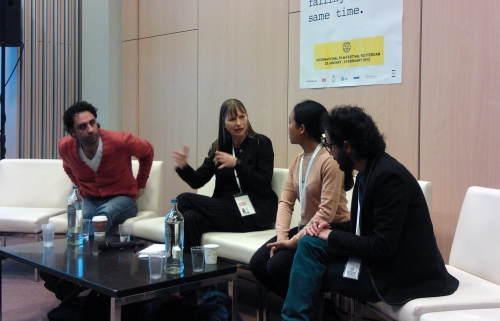On Sunday morning, Edinburgh Film Festival veteran Mary Davies talked with Greek film producer Konstantinos Kontovrakis and first time feature filmmakers Visra Vichit Vadakan (Thailand) and Sebastián Hofmann (Mexico) about making the transition from shorts to features, funding your films and the future prospects for film.
Hofmann and Vadakan are both at the IFFR with their debut films, Halley and Karaoke Girl, while Kontovrakis has produced 4 films. All felt making a short film or a sample, whether a fake trailer or material to be included in the actual film, is crucial in getting funding for your feature.
“It was a very good investment: people could not just read the script but see the visual look of the film in advance”, Hofmann told about the making of a fake trailer for Halley.
Kontovrakis’ background is in journalism and film criticism, so he had already knowledge about how to go about in the festival circuit. As a result, he started straight from producing features. Visra Vichit Vadakan expressed her admiration for the short form.
“It’s really hard to touch someone in 10 minutes. Features may have short scenes that do that, but with shorts, you have to opportunity to touch more people because of the internet. I expect more people will watch the trailer of Karaoke Girl than the actual film.”
Outside the film, Vadakan directed short content expanding Karaoke Girl’s main character and offered to the public on the film’s website. According to panelists, this shows how different the experience of making short films and moving to features is from 5 or 10 years ago.
For Hofmann, the actual transition from shorts to feature came naturally: “I was 30. I thought if I’m going to make a film eventually, now it’s the time to try.”
Vadakan talked about a leap of faith, how different the long form is from short one and how first feature was an exploration of new kind of audience and crew relation:
“I could’ve made a 100 shorts and it would not have prepared me for the long. It’s the changing relationships with characters and audience. You’re not asking them for 2 minutes, you’re asking them for 2 hours.”
Discussion also rose about the difficulty of making the infamous third feature. Festivals like IFFR concentrate on first and second features while huge pressure is built on the following third. Press and the industry feeds on newcomers like vampires.
Producer Kontovrakis gave advice for newcomer filmmakers: 1. Do not expect to make any money (“I went through several training programs as a producer and nobody tells you that.”). 2. Build really good relationships with your crew (because you’re going to need them to adjust, from time to time, to difficult situations). 3. Know your audience.
Panelists disagreed on to what extent filmmakers should be aware of their audience before making a film. To Hofmann, every film should be about ones own artistic flair. Vadakan brought up that caring more or less about audience can also be an artistic choice of the director.
Kontovrakis, however, maintained that filmmakers should be able to visualize their potential audience, even if there are just 3 people you’re aiming at. It doesn’t have to do with box office results but knowing who you’re addressing the story to helps to shape the script, too.

